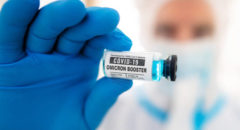
The U.S. Food and Drug Administration has delayed a decision on whether to approve emergency use of Moderna's COVID-19 vaccine in 12- to 17-year-olds until at least January, the company announced Sunday.
That's because the agency told the company on Friday that it needs more time to assess emerging international data on whether the vaccine increases the risk of a rare heart side effect called myocarditis, Moderna said in a statement.
"On Friday evening, the FDA informed Moderna that the agency requires additional time to evaluate recent international analyses of the risk of myocarditis after vaccination. The FDA notified Moderna that this review may not be completed before January 2022," the company says. "The safety of vaccine recipients is of paramount importance to Moderna. The company is fully committed to working closely with the FDA to support their review and is grateful to the FDA for their diligence."
What is myocarditis?
Myocarditis is an inflammation of the heart muscle that occurs in rare cases after vaccination, typically after the second shot and particularly in young males.
RELATED: Tips For Coping With Post-COVID Loss of Taste and Smell
Symptoms of myocarditis
If you are in the early stages of myocarditis, you may experience chest pain, rapid or irregular heartbeats, or shortness of breath. However, the symptoms of this disease vary and some people may not experience symptoms at all.
The most common symptoms are:
- Chest pain
- Rapid or abnormal heartbeat (arrhythmias)
- Shortness of breath, at rest or during activity
- Fluid buildup with swelling of your legs, ankles and feet
- Fatigue
- Other signs and symptoms of a viral infection such as a headache, body aches, joint pain, fever, a sore throat or diarrhea
RELATED: Immunocompromised May Need Fourth COVID Shot
Myocarditis in children
Children who develop myocarditis may exhibit the following conditions:
- Fever
- Fainting
- Breathing difficulties
- Rapid breathing
- Chest pain
- Rapid or abnormal heart rhythms (arrhythmias)
Several countries have raised concerns that the Moderna vaccine increases the risk of myocarditis in men aged 18-30, and officials in Finland and Sweden have recommended against the use of Moderna for men younger than 30, the Washington Post reports.
But Moderna said Sunday that the "U.S. Centers for Disease Control and Prevention [CDC] and the World Health Organization [WHO] have stated that myocarditis following vaccination with mRNA vaccines has been rare and generally mild."
"It is estimated that over 1.5 million adolescents have received the Moderna COVID-19 vaccine. To date, the observed rate of myocarditis reports in those less than 18 years of age in Moderna's global safety database does not suggest an increased risk of myocarditis in this population," the company statement adds. "The company does not yet have access to data from some recent international analyses."
The Moderna vaccine is authorized in the United States for people 18 and older, and the company asked the FDA in June to authorize it for adolescents.
RELATED: Pfizer Says COVID Vaccine Works Well in Children Aged 5 to 11
On Sunday, the company also said it will delay seeking FDA authorization of its vaccine for children ages 6-11.
Moderna's main competitor, Pfizer, has fared better with its FDA approvals.
In May, the FDA authorized the emergency use of the Pfizer vaccine for adolescents aged 12 to 15. And on Friday, the agency cleared the vaccine for children aged 5 to 11, administered in two doses of 10 micrograms each. That dose is one-third of the adolescent and adult dose. The Pfizer vaccine is expected to be available for younger children later this week, following a review by CDC vaccine advisors and a likely recommendation for approval from CDC Director Rochelle Walensky.
When to see a doctor
Sometimes, myocarditis symptoms may be similar to a heart attack. If you are having unexplained chest pain and shortness of breath, seek emergency medical help immediately. If the symptoms are severe, you should go to an emergency room. If you've had an infection recently, you should also watch out for symptoms of myocarditis and let your doctor know if they occur.









